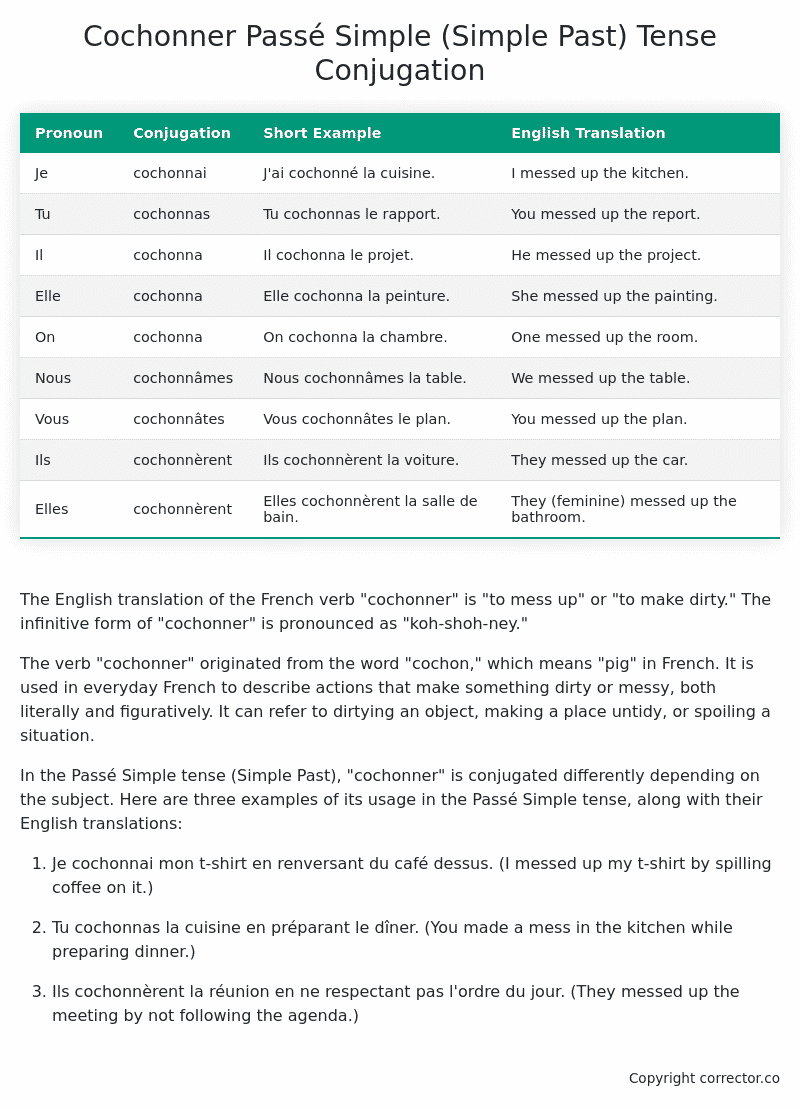Passé Simple (Simple Past) Tense Conjugation of the French Verb cochonner
Introduction to the verb cochonner
The English translation of the French verb “cochonner” is “to mess up” or “to make dirty.” The infinitive form of “cochonner” is pronounced as “koh-shoh-ney.”
The verb “cochonner” originated from the word “cochon,” which means “pig” in French. It is used in everyday French to describe actions that make something dirty or messy, both literally and figuratively. It can refer to dirtying an object, making a place untidy, or spoiling a situation.
In the Passé Simple tense (Simple Past), “cochonner” is conjugated differently depending on the subject. Here are three examples of its usage in the Passé Simple tense, along with their English translations:
-
Je cochonnai mon t-shirt en renversant du café dessus.
(I messed up my t-shirt by spilling coffee on it.) -
Tu cochonnas la cuisine en préparant le dîner.
(You made a mess in the kitchen while preparing dinner.) -
Ils cochonnèrent la réunion en ne respectant pas l’ordre du jour.
(They messed up the meeting by not following the agenda.)
Table of the Passé Simple (Simple Past) Tense Conjugation of cochonner
| Pronoun | Conjugation | Short Example | English Translation |
|---|---|---|---|
| Je | cochonnai | J’ai cochonné la cuisine. | I messed up the kitchen. |
| Tu | cochonnas | Tu cochonnas le rapport. | You messed up the report. |
| Il | cochonna | Il cochonna le projet. | He messed up the project. |
| Elle | cochonna | Elle cochonna la peinture. | She messed up the painting. |
| On | cochonna | On cochonna la chambre. | One messed up the room. |
| Nous | cochonnâmes | Nous cochonnâmes la table. | We messed up the table. |
| Vous | cochonnâtes | Vous cochonnâtes le plan. | You messed up the plan. |
| Ils | cochonnèrent | Ils cochonnèrent la voiture. | They messed up the car. |
| Elles | cochonnèrent | Elles cochonnèrent la salle de bain. | They (feminine) messed up the bathroom. |
Other Conjugations for Cochonner.
Le Present (Present Tense) Conjugation of the French Verb cochonner
Imparfait (Imperfect) Tense Conjugation of the French Verb cochonner
Passé Simple (Simple Past) Tense Conjugation of the French Verb cochonner (You’re reading it right now!)
Passé Composé (Present Perfect) Tense Conjugation of the French Verb cochonner
Futur Simple (Simple Future) Tense Conjugation of the French Verb cochonner
Futur Proche (Near Future) Tense Conjugation of the French Verb cochonner
Plus-que-parfait (Pluperfect) Tense Conjugation of the French Verb cochonner
Passé Antérieur (Past Anterior) Tense Conjugation of the French Verb cochonner
Futur Antérieur (Future Anterior) Tense Conjugation of the French Verb cochonner
Subjonctif Présent (Subjunctive Present) Tense Conjugation of the French Verb cochonner
Subjonctif Passé (Subjunctive Past) Tense Conjugation of the French Verb cochonner
Subjonctif Imparfait (Subjunctive Imperfect) Tense Conjugation of the French Verb cochonner
Subjonctif Plus-que-parfait (Subjunctive Pluperfect) Tense Conjugation of the French Verb cochonner
Conditionnel Présent (Conditional Present) Tense Conjugation of the French Verb cochonner
Conditionnel Passé (Conditional Past) Tense Conjugation of the French Verb cochonner
Conditionnel Passé II (Conditional Past II) Tense Conjugation of the French Verb cochonner
L’impératif Présent (Imperative Present) Tense Conjugation of the French Verb cochonner
L’impératif Passé (Imperative Past) Tense Conjugation of the French Verb cochonner
L’infinitif Présent (Infinitive Present) Tense Conjugation of the French Verb cochonner
L’infinitif Passé (Infinitive Past) Tense Conjugation of the French Verb cochonner
Le Participe Présent (Present Participle) Tense Conjugation of the French Verb cochonner
Le Participe Passé (Past Participle) Tense Conjugation of the French Verb cochonner
Struggling with French verbs or the language in general? Why not use our free French Grammar Checker – no registration required!
Get a FREE Download Study Sheet of this Conjugation 🔥
Simply right click the image below, click “save image” and get your free reference for the cochonner Passé Simple tense conjugation!

Cochonner – About the French Passé Simple (Simple Past) Tense
Formation
Usage
Narration
Historical Context
Interactions with other tenses
Passé Composé
Imparfait
Conditional and Subjunctive
Summary
I hope you enjoyed this article on the verb cochonner. Still in a learning mood? Check out another TOTALLY random French verb conjugation!


